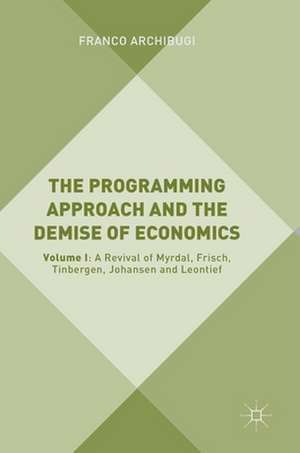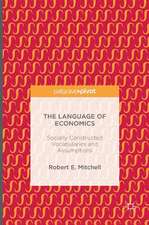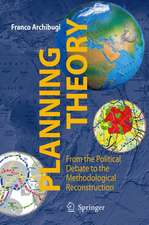The Programming Approach and the Demise of Economics: Volume I: A Revival of Myrdal, Frisch, Tinbergen, Johansen and Leontief
Autor Franco Archibugien Limba Engleză Hardback – 6 dec 2019
The author interrogates how scientific the social sciences really are before proposing a new scientific paradigm for the social sciences, a political preference function and a general programming approach. The chapters revisit hitherto neglected economists like Gunnar Myrdal, Ragnar Frisch, Vassili Leontief, and Leif Johansen, using their theory to overturn the epistemological approach of the entire science of economics.
Volume II explores oppositions to the traditional and conventional teaching of economics, whilst Volume III presents a concrete and practical example of how to build a Planning Accounting Framework (PAF), as associated with Frisch’s ‘plan-frame’ (explored in Volume II), to demonstrate the extent to which decisions and negotiations can be routed in the social sciences.
| Toate formatele și edițiile | Preț | Express |
|---|---|---|
| Hardback (3) | 644.95 lei 6-8 săpt. | |
| Springer International Publishing – 2 dec 2019 | 644.95 lei 6-8 săpt. | |
| Springer International Publishing – 2 dec 2019 | 651.67 lei 6-8 săpt. | |
| Springer International Publishing – 6 dec 2019 | 655.60 lei 6-8 săpt. |
Preț: 655.60 lei
Preț vechi: 771.30 lei
-15% Nou
Puncte Express: 983
Preț estimativ în valută:
125.46€ • 129.62$ • 104.36£
125.46€ • 129.62$ • 104.36£
Carte tipărită la comandă
Livrare economică 19 martie-02 aprilie
Preluare comenzi: 021 569.72.76
Specificații
ISBN-13: 9783319780566
ISBN-10: 3319780565
Pagini: 538
Ilustrații: CXLIV, 435 p. 1 illus.
Dimensiuni: 148 x 210 mm
Greutate: 0.84 kg
Ediția:1st ed. 2019
Editura: Springer International Publishing
Colecția Palgrave Macmillan
Locul publicării:Cham, Switzerland
ISBN-10: 3319780565
Pagini: 538
Ilustrații: CXLIV, 435 p. 1 illus.
Dimensiuni: 148 x 210 mm
Greutate: 0.84 kg
Ediția:1st ed. 2019
Editura: Springer International Publishing
Colecția Palgrave Macmillan
Locul publicării:Cham, Switzerland
Cuprins
1. How scientific are the social sciences?.- 2. Toward a new scientific paradigm for the social science: according Myrdal.- 3. Planning and planning theory: the difficult legacy of Ragnar Frisch.- 4. Basic requirements for the Programming approach.- 5. The ‘Programming approach’.- 6. The political preference function.- 7. The impact of the programming approach on socio-economic modelling.- 8. The World-Wide Vision and the ‘Central Planning’ Vision: Methodology for the Implementation of the ‘Programming Approach’ (The Great Jan Tinbergen’s Role’ ).- 9. The Pitfalls of Implicit Theorising and the Abuse of Indirect Statistical Inference: Leontief ’s Criticism (of Robinson, Kahn, Hicks, Keynes and Many Other Authors, Based on Implicit Theorising).
Notă biografică
Professor Franco Archibugi is the Founder and Chairman of the Planning Studies Centre in
Rome, Italy. Prior to this he taught economics at the University of Florence, Italy and planning
at the Universities of Calabria, Palermo, and Naples, Italy. He studied history and philosophy at
the Universities of Rome and Heidelberg, and economics at the London School of Economics.
He is the author of many books and papers on socio-economic, environmental and urban
planning published in Italian, English and other languages.
Rome, Italy. Prior to this he taught economics at the University of Florence, Italy and planning
at the Universities of Calabria, Palermo, and Naples, Italy. He studied history and philosophy at
the Universities of Rome and Heidelberg, and economics at the London School of Economics.
He is the author of many books and papers on socio-economic, environmental and urban
planning published in Italian, English and other languages.
Textul de pe ultima copertă
In this book – the first of three volumes – Franco Archibugi sets out to create an epistemology
of economics, arguing for a radical overturning of the conventional analysis from a
“positive” approach to a “programming” approach. This overturning leads to a reappraisal
of the foundations of Economics itself, and to an improved integration of Economics as an
autonomous discipline alongside Sociology, Political Science, Operational Research, Social
Engineering and Physical or Spatial Planning. The author interrogates how scientific the social sciences really are before proposing a new
scientific paradigm for the social sciences, a political preference function and a general
programming approach. The chapters revisit hitherto neglected economists like Gunnar
Myrdal, Ragnar Frisch, Vassili Leontief, and Leif Johansen, using their theory to overturn the
epistemological approach of the entire science of economics.
Volume IIexplores oppositions to the traditional and conventional teaching of economics,
whilst Volume III presents a concrete and practical example of how to build a Planning
Accounting Framework (PAF), as associated with Frisch’s ‘plan-frame’ (explored in Volume II),
to demonstrate the extent to which decisions and negotiations can be routed in the social
sciences.
of economics, arguing for a radical overturning of the conventional analysis from a
“positive” approach to a “programming” approach. This overturning leads to a reappraisal
of the foundations of Economics itself, and to an improved integration of Economics as an
autonomous discipline alongside Sociology, Political Science, Operational Research, Social
Engineering and Physical or Spatial Planning. The author interrogates how scientific the social sciences really are before proposing a new
scientific paradigm for the social sciences, a political preference function and a general
programming approach. The chapters revisit hitherto neglected economists like Gunnar
Myrdal, Ragnar Frisch, Vassili Leontief, and Leif Johansen, using their theory to overturn the
epistemological approach of the entire science of economics.
Volume IIexplores oppositions to the traditional and conventional teaching of economics,
whilst Volume III presents a concrete and practical example of how to build a Planning
Accounting Framework (PAF), as associated with Frisch’s ‘plan-frame’ (explored in Volume II),
to demonstrate the extent to which decisions and negotiations can be routed in the social
sciences.
Caracteristici
Presents an argument that leads to a reappraisal of the foundations of economics Reappraises the methodological aspects of political economy and the social sciences Promotes a new theory of 'Planology' as a new unified approach to planning and as an autonomous discipline Develops the outline of a "Post-Economics" operational and managerial planning perspective















